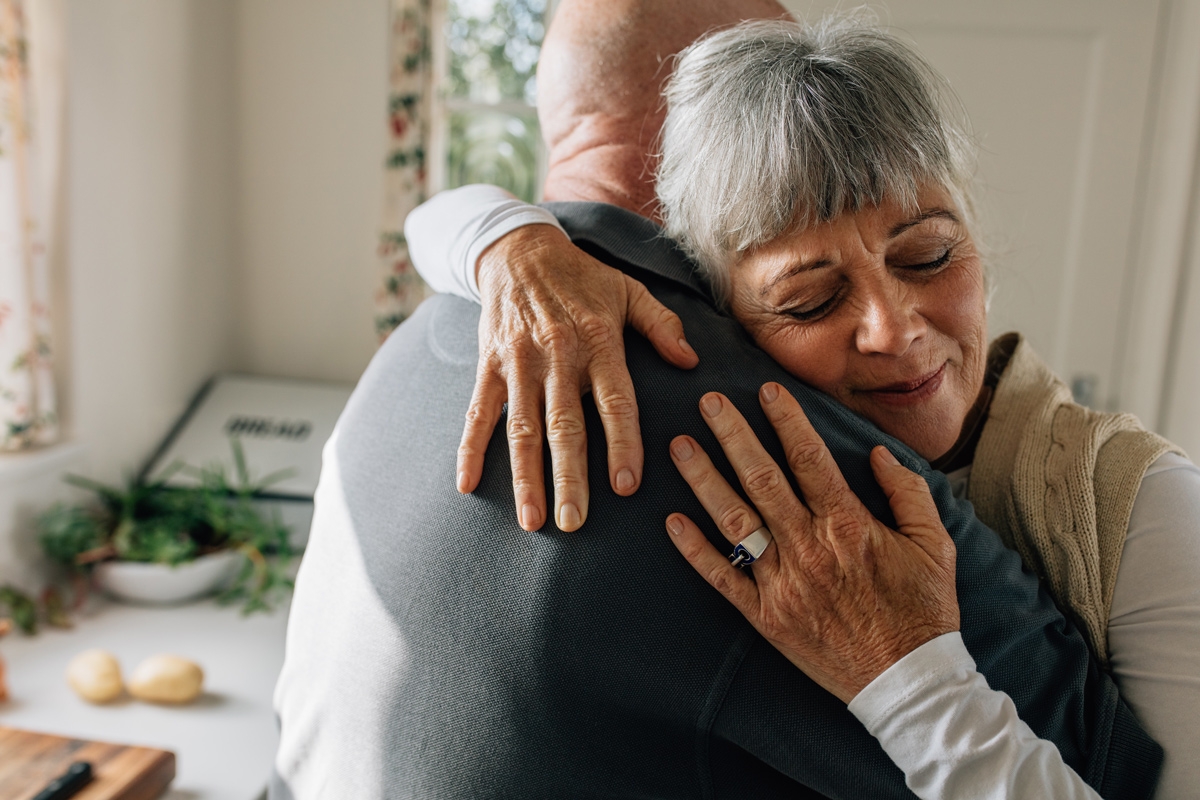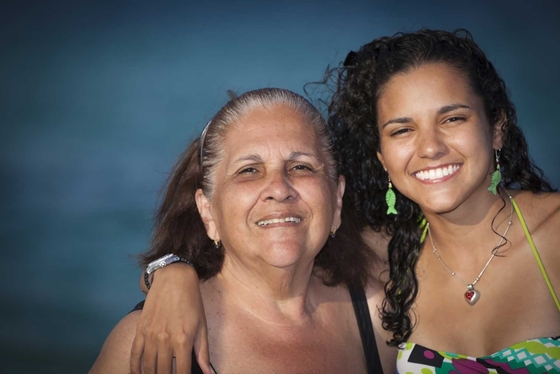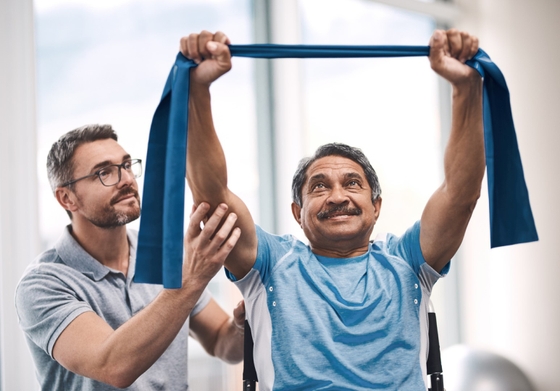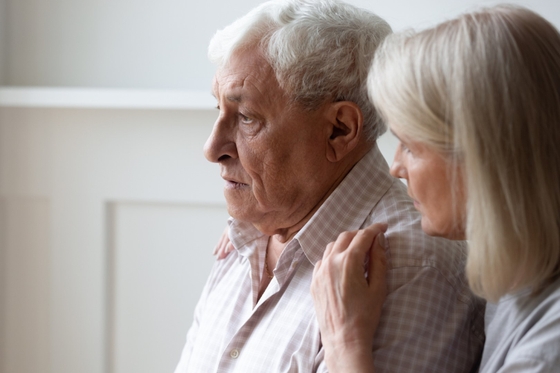
Support after a heart attack
Key takeaways
5 min read
- It's normal to feel worried, confused or overwhelmed after a heart attack. You don't have to navigate your recovery alone - support is available.
- Cardiac rehabilitation (cardiac rehab) is a wonderful source of support after a heart attack. Cardiac rehab programs offer tailored advice, education and supervised exercise. They’re also an opportunity to meet other people living with heart disease.
- Join the MyHeart MyLife support program - a free online program for people who have had a heart attack, angina or been diagnosed with coronary heart disease. Over 12 weeks, you’ll get information and support to help you to live well with heart disease. Carers can join too.
- Feeling down, sad or worried is common after a heart attack. For some people, these feelings can lead to depression and anxiety. If you’re struggling with your mental health, there are many support services available to you.
Heart attack support: You're not alone in your recovery
A heart attack can be a life-changing experience. Remember that you’re not alone. Support is available. Read on to learn more about the different types of support.
Cardiac rehabilitation
Cardiac rehabilitation (cardiac rehab) programs are a great source of support after a heart attack. Led by healthcare professionals, these programs offer tailored advice, education and supervised exercise.
Attending cardiac rehabilitation can help you recover and get back to your normal activities sooner. You’ll also get to meet other people who are living with a heart condition.
By attending cardiac rehab, you’ll get information about:
- your heart condition and treatment
- returning to your usual activities, like work, driving, physical activity and having sex
- forming heart-healthy habits to reduce your risk of a future heart attack
- managing your medicines
- stopping smoking or vaping (if you smoke or vape)
- knowing the warning signs of a heart attack and what to do in an emergency
- looking after your mental health and wellbeing.
Cardiac rehab programs are available in different formats. You can participate in cardiac rehab:
- over the phone or online
- in person, at a hospital, clinic or community centre
- in a group or by yourself.
Participating in cardiac rehab has many benefits:
- helps you recover more quickly to get back to everyday life
- assists you to cope with what has happened
- helps you to better manage your heart health
- reduces your risk of developing further heart problems.
Your healthcare team will refer you to a cardiac rehabilitation program before you are discharged from hospital.
If you don’t have a referral or need more information, ask your doctor, nurse or health worker. You can also find a local cardiac rehabilitation program near you by searching our Cardiac Services Directory.
MyHeart MyLife support program
The MyHeart MyLife support program can help you (and those caring for you) on your recovery journey after a heart attack. By joining, you’ll have access to information and support to help you to live well with heart disease.
Delivered over 12 weeks, you’ll receive:
- access to an online dashboard with bite-sized articles and short videos to help you better manage your condition
- supportive text messages and emails to motivate and inspire
- access to the MyHeart MyLife online support community, where you can connect with others on a similar journey to you.
The free program covers a range of topics, from forming heart-healthy habits and looking after your mental health and wellbeing, to managing your medicines.
Heart Foundation peer support network
Join our peer support network to connect with others who have also been diagnosed with a heart condition or are caring for someone who has. Connecting with other people can ease feelings of isolation, provide reassurance and help you to lead a heart-healthy life.
The Heart Foundation has two online support communities available:
- The MyHeart MyLife online support community is a safe virtual space for adults living with a heart condition in Australia to give and receive support from others on a similar journey. We also welcome caregivers, loved ones, friends and family supporting people living with a heart condition.
- The Supporting Young Hearts online support community is for people aged 18-45 years (and their support people). Members can share their experiences and give and receive support from others on a similar recovery journey.
Other support services
In addition to your GP, cardiologist and the rest of your healthcare team, there are lots of other support services available. We’ve listed some of these below.
Mental health support
Crisis support
- Lifeline: call Lifeline (13 11 14) for confidential crisis support via phone, text or online chat.
13 Yarn: call 13YARN (13 92 76) for Aboriginal and Torres Strait Islander crisis support.
General support
- Australian Centre for Heart Health: to access the Cardiac Counselling Clinic of the Australian Centre for Heart Health, phone 03 9326 8544 or register yourself on their website.
- Beyond Blue: get mental health support from Beyond Blue by calling 1300 22 4636 or chatting online to a counsellor. Visit the Beyond Blue website for more information about mental health, treatment and management or to find a mental health practitioner in your area.
- Head to Health: call Head to Health on 1800 595 212 for confidential mental health advice and support. (Please note that Head to Health is not a crisis or emergency service. For urgent support, call Lifeline or Triple Zero (000)). Visit the Head to Health website for mental health information, services and support. No appointment or GP referral is required.
- WellMob: access online resources focusing on social, emotional and cultural wellbeing for Aboriginal and Torres Strait Islander Peoples on WellMob.
- Rural mental health services: rural mental health services are listed in this help sheet from the National Rural Health Alliance.
Support for carers
Carer Gateway is an Australian Government program providing free services and support for carers.
Support for other conditions
- Diabetes Australia (Phone: 1800 177 055)
- Kidney Health Australia (Phone: 1800 454 363)
- Stroke Foundation (Phone: 1800 787 653)
References
- Brieger D, Cullen L, Briffa T et al. National Heart Foundation of Australia & Cardiac Society of Australia and New Zealand: Comprehensive Australian clinical guideline for diagnosing and managing acute coronary syndromes 2025. Heart Lung Circ. 2025;34(4):P309-397. doi: https://doi.org/10.1016/j.hlc.2025.02.102
- Commonwealth of Australia as represented by the Department of Health and Aged Care. Australian guideline for assessing and managing cardiovascular disease risk. 2023. Accessed 14 Feb 2025. www.cvdcheck.org.au
- Redfern J, Gallagher R, Maiorana A et al. Cardiac rehabilitation and secondary prevention of CVD: time to think about cardiovascular health rather than rehabilitation. npj Cardiovasc Health. 2024;1(22). doi: 10.1038/s44325-024-00017-7
- Steen DL, Khan I, Andrade K, Koumas A, Giugliano RP. Event rates and risk factors for recurrent cardiovascular events and mortality in a contemporary post acute coronary syndrome population representing 239 234 patients during 2005 to 2018 in the United States. J Am Heart Assoc. 2022;11(9). doi: 10.1161/JAHA.121.022198
You might also be interested in...

Caring for someone after a heart attack
Your role as a carer for a heart attack patient is an important one – explore some useful things to know.

What is cardiac rehab?
Cardiac rehab is proven to keep you out of hospital and reduce your risk of death from heart conditions.

Feelings and emotions after a heart attack
This is a guide to how you might be feeling after a heart attack.
Last updated30 September 2025
Last reviewed23 January 2024
